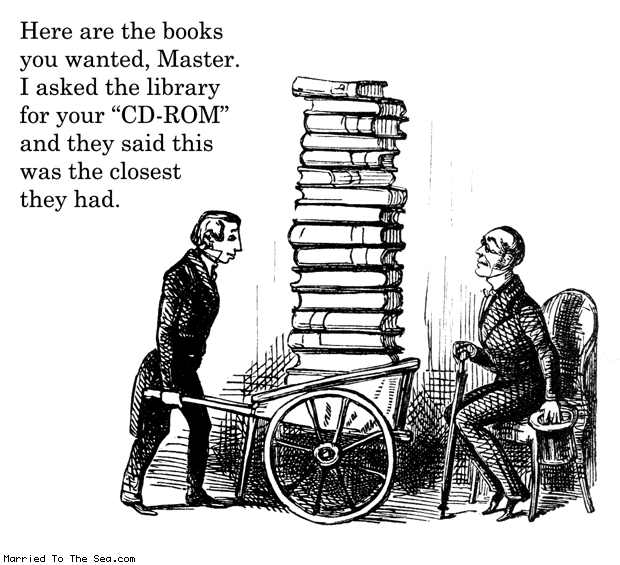I know most libraries have books. That’s about the only thing I know at this point. But I have ideas. Maybe some are right, maybe some are wrong, and maybe those wrong ideas are the right ones. The hope in those ideas is why I am writing this,. At some point in the future I want to be able to look back at this and reflect on what I’ve learned, what I’ve lost, and maybe draw some sort of brilliant idea out of my present naïveté.
I believe that libraries are primarily cultural institutions. They house societies collected knowledge, societies potential knowledge, and the building blocks of societies future knowledge. Libraries house cultural artifacts, most importantly books, but also knowledge in other forms such as music on compact disc, hence the collected knowledge. At the same time libraries also have more information than any one person can possibly accumulate in a life time. Good librarians haven’t read everything in their collection, they just know what and where it is, and if they don’t they know how to find it. If a book is forgotten but still in the libraries collection, than I don’t think its information can be considered part of societies knowledge base. But the beautiful thing about preserving that knowledge is that it can be found again, hence the idea of potential knowledge. Libraries also contain the building blocks for future knowledge, businesses are started there, papers are researched there, the metaphors that inspire us to dream new dreams are found on its shelves. Increasingly but also traditionally, libraries provide secondary services that allow for knowledge to be created. Ray Bradbury wrote the Fahrenheit 451 in the basement of the Los Angeles Library on a public type writer. Who knows what books are being written on public computers today at your local library?
I believe that libraries are important equalizers in our modern era. Andrew Carnigee, who could be considered the patron saint of public libraries in the US, built libraries across the country, so that every man could have access to the education that resided in its books. Today, information is more important, less centralized, and generated at an alarming rate. One of the most important services libraries give us is access to parts of this new infoscape that have been walled off. Even more important they give us access to professionals, the librarian, who understand the information ecology and can help people navigate to find the facts in the midst of an exponentially increasing mire of marketing, and opinion. Access, to this increasingly walled off set of hard information is one of the most important services libraries provide. I think it’s the real reason why libraries have computers, to facilitate fence hopping, helping not just information be free, but also letting people freely access it. The preservation of access to the closing fields of knowledge is arch stone for libraries. It’s followed on either side by access to producing content, and access to digital services.
What about librarians, what are their role in libraries? I think librarians have a three fold role in the modern library: The first is preserving the knowledge of the past. Preserving this data requires both preservation of the actual artifacts as well as digitizing them, as able, to keep that knowledge active in an increasingly digital world. Second: A librarian must facilitate access to information. They do this in several ways:
-Traditional reference services.
-Computer education
-Information education
The third point probably requires a brief explanation. Librarians are not merely the finders of information, or the curators, I believe librarians are the guides. Like any good guide, as they lead people to there quarry, they should educate about the information ecology, and teach others how to navigate information for themselves. This sort of knowledge and education is called information literacy, or information fluency. Librarians play an important role in our society in maintaining and spreading information literacy. This role is especially important in the face of fairly quality and easy to use services like Google. Finally, librarians have to facilitate the creation of new content. That means supporting authors, helping coordinate community activities, and directly creating content themselves (either as reviews of content, unique cultural artifacts, or new ways of accessing data, a sort of meta content). This focus must be rooted in the communities they serve. Libraries are increasingly becoming digital commons. By continuing and expanding their support for local libraries build communities out of suburbs, and maintain unique local identities. By popularizing the local they give it cultural value, which in turn creates a necessary base of originality in the new world of the global monoculture.
I know that what I’ve written above may at time seem contrarian, ludicrous, and ignorant. The point in writing this is, as explained above, is to provide myself a control against which to measure bench marks. I’ve posted it in the hopes that it might inspire others to take the same fool hearted plunge I did; or for those who have come before, a spark to recapture their own youthful idealism. I’ll try and keep these posts coming throughout the school year, and a head as I learn about and engage more fully with Library and Information Sciences and librarianship. Classes have just started, and I feel like I’ve already learned so much.
Best,
Zack
